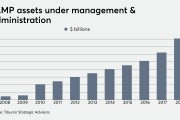A budding rivalry between Riskalyze and Orion Advisor Solutions is heating up.
Though the companies have different origins, they look increasingly similar in the products and services they now offer advisors. Riskalyze began as a digital client assessment tool before expanding into portfolio management with trading, rebalancing and a marketplace of managed account strategies.
Now Orion, which started out in portfolio management before
Though Riskalyze and Orion still work together closely, both are competing to be the core technology that anchors advisors’ digital workstations. They may also be following the playbook of the late Jud Bergman, who used acquisitions to build Envestnet from an outsourced investment manager into a technology behemoth.
“There is a lot of overlap now, and the integration partners are starting to invade each other’s turf,” says Joel Bruckenstein, a technology consultant and founder of the T3 conference. “I think Orion is trying to be aggressive. They’re not necessarily focused on what Riskalyze is doing, but on building out a true, all-in-one platform.”
“Larger technology companies are in a growth path. It’s a little bit like an arms race,” Bruckenstein adds.
Embedding HiddenLevers’ portfolio stress-testing and investment proposal engine into Orion’s technology, model marketplace and business intelligence products will create a single, tightly integrated experience, which CEO Eric Clarke says is “probably one of the the largest frustrations that advisors deal with day to day.”
The technology can also help advisors communicate with clients about the impact that macroeconomic events have on a portfolio or financial plan, says Raj Udeshi, HiddenLevers’ founder and chief revenue officer.
“We help the advisor stress-test portfolio scenarios upfront to properly manage client expectations and create stories about market volatility that are meaningful to investors,” Udeshi says. “We provide nuanced conversations instead of a single-number approach to risk. It’s not a sales facade for somebody else’s product.”
Though Udeshi doesn’t name Riskalyze directly, the company’s core product, the Risk Number, assigns clients a number to quantify their tolerance to market risk.
When asked for comment, a Riskalyze spokesperson congratulated “our friend and integration partner [Orion CEO] Eric Clarke” on the deal. The company is instead focused on the launch of Build My Tech Stack, a new feature the company hopes can alleviate the headache of getting various tech components to work together.
After specifying which custodians and technologies an advisor uses, or wants to use, Build My Tech Stack provides step-by-step instructions on how to assemble and optimize their digital dashboard around Riskalyze, according to the company.
“Riskalyze is the central hub [advisors] can plug everything else into,” says Dan Bolton, the fintech’s managing director of customer marketing.
The moves by Orion, Riskalyze and others — the recently
“Everyone is trying to become Envestnet,” Tishkevich says. “Because there is a lot of M&A activity, there are going to be more firms trying to put together that all-in-one solution, creating a turnkey offering for RIAs. That’s going to continue.”
While this approach
“In order to build those unique capabilities, it would be difficult to use a single platform to do it all,” he adds. “At the end of the day, it’s hard to be best at everything.”
It can also be difficult to navigate internal integrations after one technology firm buys another, says Tishkevich, who witnessed the challenges first-hand after selling his previous company, financial planning software Finance Logix, to Envestnet in 2015.
Or as Bruckenstein puts it: “The devil is always in the details. It’s about putting all the pieces together and making it work.”
As for Envestnet, the company doesn’t seem overly concerned with new competition for advisors’ technology budgets.
“We are helping advisors connect their clients’ financial lives in a way no one else has managed to do,” says an Envestnet spokesperson in an emailed statement.







